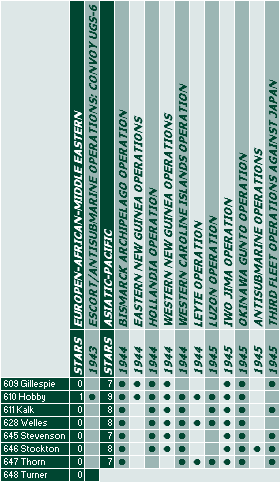
Nineteen forty-three was a year of unheralded operations for the squadron. In January, Gillespie and Kalk deployed to the Aleutians Islands, where Gillespie screened cruisers Indianapolis and Richmond in bombarding Attu Island. In March, the two ships returned to San Francisco and in April went to the Atlantic. There they joined Hobby, which in February had begun escorting convoys between New York and Casablanca and later to the Mediterranean, earning the squadron’s only service star of the year. The four destroyers of DesDiv 23 also escorted convoys in the Atlantic throughout 1943. Last-commissioned Welles arrived from the Pacific in November.
World War II operations of destroyers
originally attached to Squadron 19

In contrast, 1944 began with a bang. On 3 January, Thorn and Turner were anchored near the Ambrose Lightship at the entrance to New York’s main shipping channel when Turner sustained a series of explosions of unknown origin and was lost.
Later that month, the remainder of the squadron departed for the Pacific. There, in March, it was attached to the Seventh Fleet for General MacArthur’s seizure of the Admiralty Islands, which concluded the Bismarck Archipelago operation, and continued west with Squadron 21, Squadron 24 and a reconstituted Destroyer Division 24 in support of his jungle campaign along New Guinea’s north coast.
On 10 April, Thorn struck an uncharted reef at Hollandia. After repairs on the West Coast, she rejoined the squadron and, when it went home, continued operating in the Philippines. She was present at the Battle of Surigao Strait.
On 12 June off Biak, Kalk sustained a bomb hit and also went to the West Coast for repairs. She then returned to operate from Ulithi in screening assignments and anti-submarine patrols.
In September, the squadron, still without Thorn, screened transports during the invasion of Palau. Afterward, Gillespie, Stevenson and Stockton took their turns for West Coast overhaul and thus missed operating in the Philippines between October and January 1945.
They returned to bring the squadron back to full strength for the assault on Iwo Jima in February. There, on the 21st, Stockton was in a formation attacked by four suicide planes, which sank escort carrier Bismarck Sea (CVE 95) and damaged Lunga Point (CVE 94).
For the Okinawa operation that followed, the squadron operated with replenishment units of the Logistics Support Groups. On 31 March, Stockton and Morrison (DD 560) sank Japanese submarine I-8.
In the spring of 1944, Buchanan had been reassigned from a reorganized DesRon 12 to restore DesDiv 23 to four ships. Closing Japan in August, however, she rejoined DesRon 12’s Lansdowne and Lardner in escorting battleship South Dakota into Tokyo Bay on the 28th. She also transported General MacArthur’s party to battleship Missouri for the surrender ceremony on 2 September.
In June, meanwhile, Hobby and Welles had gone to the West Coast for their long-awaited overhauls. They where there when war ended.
After the surrender, Gillespie, Kalk, Stevenson, Stockton and Thorn remained in the western Pacific for occupation duty before sailing for home—the first two to the East Coast via San Diego; the latter three via the Cape of Good Hope (see photo at the top of this page of Stevenson, Stockton and Thorn in company with Lansdowne, Lardner and Nelson)—arriving in December.
Source: Destroyer History Foundation database and Dictionary of American Naval Fighting Ships entries for individual ships.